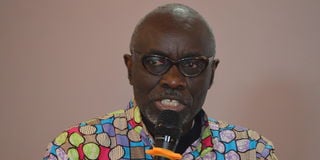
African governments are not prepared to tackle the next pandemic, a professor of medical microbiology and tropical medicine at the Kenya AIDS Vaccine Initiative (KAVI) has warned.
Prof Walter Jaoko, the director of KAVI and former Department of Medical Microbiology at the University of Nairobi chairperson, said the level of epidemic preparedness in the continent is at its lowest.
Speaking during a Science Media Café in Nairobi on Friday organised by the Media for Environment Science, Health and Agriculture (MESHA), he said the Epidemic Preparedness Index paints a grim picture of disaster management in Africa.
“We know the next epidemic will come and the question is whether we are prepared. Epidemic Preparedness Index is a tool used to try and determine how prepared countries are. The tool shows that most African countries are not prepared,” said Prof Jaoko.
Jaoko, who has over 30 years of experience in teaching and research in various aspects of infectious diseases transmission, pathology, treatment, prevention and control, noted that one of the biggest impediments is the lack of adequate funding.
“African governments need to set aside enough funds to prepare for the next pandemic. They need to set up national public health institutes that can plan and organise how to handle the next pandemic,” added Jaoko.
African Union
He added: “African governments need to work closely with the African Union (AU). The AU has a mechanism through the African Centre for Disease Control and Prevention (CDC) which will give them guidelines and tools on what needs to be done as we wait for the next pandemic.”
“We need to have health care workers that are well trained for epidemic preparedness. We also need to strengthen our public health institutes and care facilities by equipping them well with equipment and drugs,” he added.
He observed that in 2001 the Abuja Declaration called upon the African Union member countries to commit to health system preparedness by allocating at least 15 per cent of their annual budgets to the health sector.
Kenya’s 2022/2023 overall budget estimates of Sh3.31 trillion gave health its biggest allocation ever of Sh146 billion which translates to about 4.41 per cent of the total budget.
In the last financial year of 2021/2022, the health budget was allocated Sh121.1 billion.
However, this massive budgetary allocation still fell short of the Abuja declaration even as Director-General of the World Health Organization (WHO) Tedros Adhanom Ghebreyesus reminded countries to increase their investments in the health sector.
Prof Jaoko reiterated that health is a major component of any nation’s development.
“Without a healthy population, a country will record a zero development record.”
He called upon the African governments to fulfil their commitments by increasing the health sector budgets as per the Abuja Declaration signed 21 years ago.
He said, with the current harsh economic conditions in Africa, the level of funding by African governments may not easily be fulfilled.
However, he urged the African governments to collaborate with other stakeholders and form Private Public Partnerships and commit some money which is topped by the private sector.
“Private sector has a keen interest in health because they are also major stakeholders as they would like to have a healthy workforce to meet their objectives to prepare adequately to fight future epidemics,” he said.
Address corruption
Prof Jaoko called on African governments to address corruption that has led to the embezzlement of billions of shillings in the health and other sectors.
“African governments should put in place mechanisms to ensure the health sector money is safe and secure,” he added.
On African researchers, Prof Jaoko said the continent has a huge potential for research and development but the lack of funding by the African governments remains a major hindrance.
“A lot of research happening in Africa is funded by bilateral partners. It is only South Africa that has set sufficient funds to boost research in their country.”
He said the National Research Fund Kenya is grossly underfunded and is not working well.
“I urge the government to become a little bit more serious and pump in more funds for research as we have a pool of researchers in Kenya willing to conduct various types of research in the health sector,” he said.
fmureithi@ke.nationmedia.com

Leave A Comment